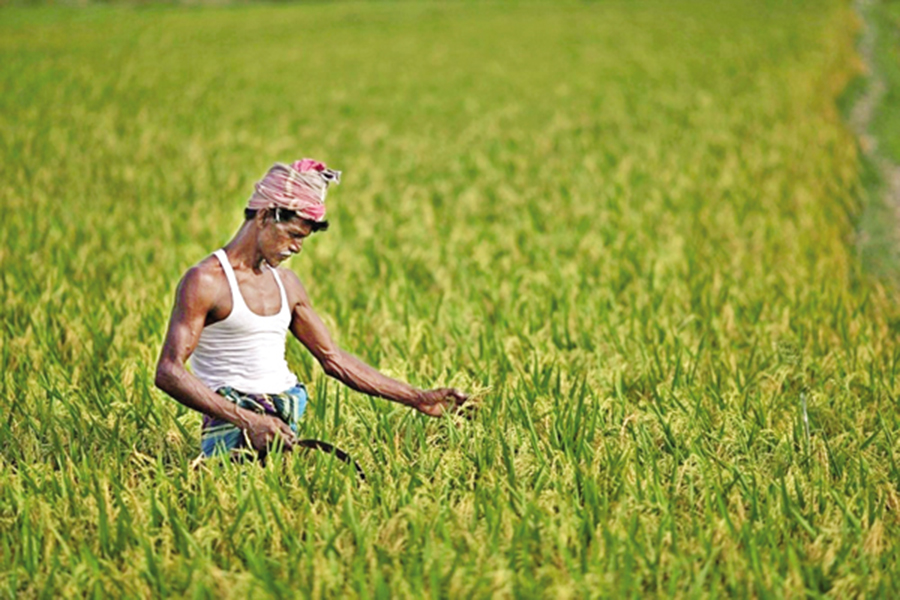Why the government should consider removing taxes on Agriculture Insurance in Bangladesh

Published :
Updated :

The cost and accessibility of agriculture insurance in Bangladesh are influenced not only by existing policies or the absence of them but also by broader economic pressures, including trade-related taxes. Taxes such as Value Added Tax (VAT) and non-resident tax for foreign reinsurance are currently applicable for agriculture insurance products. These taxes are loaded into the agriculture insurance premiums and are always passed onto the end-customers, who are primarily smallholder farmers. Consequently, the insurance premiums become more expensive and farmers' willingness to pay the higher premiums reduces significantly, along with reduced incentives for other value-chain partners to collaborate and add value to the product being offered to the farmers. The government of Bangladesh should seriously consider waiving taxes, such as VAT on agriculture insurance, which would result in premium levels automatically reducing (e.g. by 15%). Alternatively, if the premium levels were kept at the same level, then the quality of the agriculture insurance products and 'value for money' for farmers would improve significantly in different ways.
In Bangladesh, agricultural insurance products have been implemented for smallholder farmers, particularly since 2014, insuring over 1.0 million smallholder farmers cumulatively till date. There are many technical, operational and policy-level challenges for the scaling-up and viability of agriculture insurance in Bangladesh. One of the most significant barriers is affordability. Premium rates for agriculture insurance in Bangladesh vary widely, ranging from 2.0 per cent to 20 per cent of the insured value, depending on factors such as the type of risk, geographic location, and farmer profile.
If VAT were waived on agriculture insurance, premiums would immediately drop by approximately 15 per cent, offering a substantial cost reduction for smallholder farmers and aggregators such as financial institutions, NGOs, and agribusinesses. Alternatively, maintaining current premium levels while removing VAT would allow for significant product enhancements -- particularly by increasing the economic value insured. Most agricultural insurance products available to smallholders in Bangladesh are parametric or index-based, relying on weather variables such as rainfall and temperature, or on crop yield data. The design of these products, especially the choice of parameters like the payout trigger (the threshold at which payouts begin) -- has a strong influence on both the level of coverage and the cost of premiums. Therefore, if VAT were waived and premium levels remained the same, a greater portion of the premium could be allocated toward covering the underlying risks. This would allow for more lenient trigger levels, resulting in more frequent and higher payouts when adverse weather or poor yields occur.
For example, in a weather index insurance product covering dry spells and excessive rainfall in Kurigram for maize farmers, VAT collected from approximately 1,400 smallholder farmers between October and December 2024 amounted to BDT 137 per farmer. Payouts were made for dry spells; however, if VAT had been waived and the same premium rate applied, 97 per cent of the insured farmers would have received an additional BDT 313 in claim payouts. This means that for every BDT 1.0 of VAT waived by government, farmers would have received BDT 2.2 more in compensation.
Similarly, for another index insurance product insuring heat waves for dairy livestock in Kushtia, Mymensingh and other districts, for every 1 taka of VAT waived, affected farmers would have received 6 taka higher claims for the worst season in 15 years. These examples demonstrate a clear pattern: waiving VAT on agricultural insurance would allow for more favorable product parameters --such as more lenient payout thresholds (trigger levels) -- which would result in significantly higher and more frequent payouts, especially in seasons marked by extreme weather events like droughts, floods, heavy rainfall, or heatwaves. This would substantially improve the value proposition of index insurance for smallholder farmers in Bangladesh.
Currently, agriculture insurance constitutes a relatively small commercial line of business. For instance, for one of the major insurers very active in agriculture insurance in Bangladesh, waiving VAT would result in a tax exemption of approximately 1.0 crore taka as of 2024. If this exemption were accompanied by proportional improvements to the products, such as increasing the economic value insured, the total insured value for this portfolio could rise by about 35 crore taka, from roughly 220 crore taka to 255 crore taka in 2024, as a consequence of waiving the 1.0 crore VAT.
Taxes on agricultural insurance premiums, including VAT and GST, have been successfully waived in many countries such as Fiji, India, Kenya, Malaysia, Vietnam, Uganda, and Rwanda. The primary policy goals behind these exemptions have been to make agriculture insurance more affordable for smallholder farmers and to incentivise insurers and aggregators to offer these products as risk carriers and distribution channels.
Mitigating key agricultural production risks is crucial for Bangladesh's food security and agricultural development. Insurance can be used as a risk-transfer tool to help farmers along with agribusinesses, banks and microfinance institutions deal with major agricultural risks, including climate risks. To support these policy objectives and enhance financial inclusion in rural areas, the government of Bangladesh should consider promoting agricultural insurance more actively. Waiving taxes such as VAT on agriculture insurance premiums is a relatively simple yet impactful measure through which the government can strengthen this critical sector.
Agrotosh Mookerjee writes on behalf of the Bangladesh Microinsurance Market Development Programme (BMMDP), implemented by Swisscontact. He is a Fellow of the Institute of Actuaries (UK) and Managing Director of Risk Shield Consultants Ltd.


 For all latest news, follow The Financial Express Google News channel.
For all latest news, follow The Financial Express Google News channel.